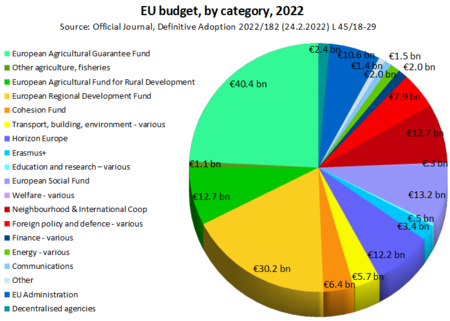
Back موازنة الاتحاد الأوروبي Arabic Бюджет на ЕС Bulgarian Pressupost de la Unió Europea Catalan Rozpočet Evropské unie Czech Haushalt der Europäischen Union German Presupuesto de la Unión Europea Spanish Euroopa Liidu eelarve Estonian Euroopan unionin budjetti Finnish Budget de l'Union européenne French תקציב האיחוד האירופי HE

| Submitted by | European Commission |
|---|---|
| Submitted to | European Parliament and Council of the European Union |
| Total revenue | €170.6 billion (2022) |
| Total expenditures | €170.6 billion (2022) |
| Program Spending | €170.6 billion (2022) |
| Website | Budget online |
| This article is part of a series on |
 |
|---|
|
|
The budget of the European Union is used to finance EU funding programmes (such as the European Regional Development Fund, the Cohesion Fund, Horizon Europe, or Erasmus+) and other expenditure at the European level.
The EU budget is primarily an investment budget. Representing around 2% of all EU public spending, it aims to complement national budgets. Its purpose is to implement the priorities that all EU members have agreed upon. It provides European added-value by supporting actions which, in line with the principle of subsidiarity and proportionality, can be more effective than actions taken at national, regional or local level.
The EU had a long-term budget of €1,082.5 billion for the period 2014–2020, representing 1.02% of the EU-28's Gross National Income (GNI)[1] and of €1,074.3 billion for the 2021–2027 period.[2] The long-term budget, also called the Multiannual Financial Framework, is a seven-year spending plan, allowing the EU to plan and invest in long-term projects.
Initially, the EU budget used to fund mainly agriculture. In the 1980s and 1990s, Member States and the European Parliament broadened the scope of EU competences through changes in the Union's founding Treaties. Recognising the need to support the new single market, they increased the resources available under the Structural Funds to support economic, social and territorial cohesion. In parallel, the EU enhanced its role in areas such as transport, space, health, education and culture, consumer protection, environment, research, justice cooperation and foreign policy.
Since 2000, the EU budget has been adjusted to the arrival of 13 new Member States with diverse socioeconomic situations and by successive EU strategies to support jobs and growth and enhanced actions for the younger generation through the Youth Employment Initiative and Erasmus+. In 2015, it has set up the European Fund for Strategic Investments (EFSI), "so called Juncker plan” allowing to reinforce investments in the EU.
The largest share of the EU budget (around 70% for the period 2014–2020) goes to agriculture and regional development. During the period 2014–2020, the share of EU spending on farming is set at 39%. In 1985, 70% was spent on farming. Farming's relatively large share of the EU budget is due to the fact that it is the only policy funded almost entirely from the common budget. This means that EU spending replaces national expenditure to a large extent.
The second share of EU spending goes to regional development (34% for the period 2014–2020). EU funding for regional and social development is an important source for key investment projects. In some EU countries that have otherwise limited means, European funding finances up to 80% of public investment.[3] However, EU regional spending does not just help poorer regions. It invests in every EU country, supporting the economy of the EU as a whole.
6% of the EU budget goes for the administration of all the European Institutions, including staff salaries, pensions, buildings, information technology, training programmes, translation, and the running of the European School system for the provision of education for the children of EU staff.
- ^ European Union, Integrated Financial Reporting Package Overview, Financial year 2017. 2018. https://europa.eu/!hK34QQ
- ^ European Council conclusions, 10-11 December 2020 Retrieved 15 January 2021.
- ^ European Structural and Investment Funds
© MMXXIII Rich X Search. We shall prevail. All rights reserved. Rich X Search



